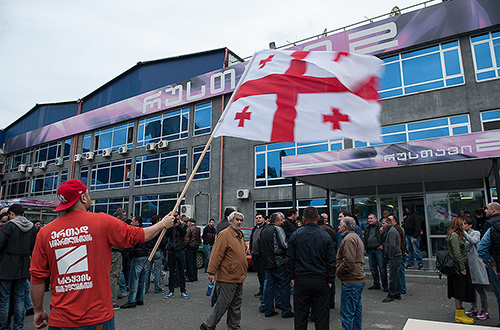
Georgia Inches Closer to Civil Confrontation, as New Wiretapped Recordings Surface
Publication: Eurasia Daily Monitor Volume: 12 Issue: 201
By:

The ongoing political and legal stand-off between the Georgian government and the opposition over the ownership of the Rustavi 2 TV channel (Rustavi 2, Media.ge, October 2; see EDM, October 26) has become even more tense as new wiretapped recordings surfaced on October 29. The Ukrainian website Uarevo.in.ua published alleged recently recorded phone conversations between former president Mikhail Saakashvili (now the governor of Ukraine’s Odesa region) and two of his close political allies in Georgia: Nika Gvaramia, the chief of Rustavi 2, and Giga Bokeria, the former secretary of national security and, currently, one of the leaders of the opposition party United National Movement (UNM). In the recorded five-minute-long conversations with each of these two individuals, Saakashvili tasks Gvaramia and Bokeria to prepare supporters for a physical stand-off with the government. He tells them to “erect barricades” in the front yard of Rustavi 2 headquarters and “turn its surroundings into a fortress” because the opposition may have to follow a “revolutionary scenario” for taking over power. Moreover, Saakashvili urges them to “find ‘boeviks’ ” (fighters) and be prepared even for shootings from firearms, as there might be a need for a “physical confrontation to attract [international] attention” (Uarevo.in.ua, October 29). Gvaramia and Bokeria both confirmed that such conversations indeed took place (Presa.ge, October 30; Tabula.ge, October 29), while Saakashvili has tried to justify himself, stating that he would do everything to defend Rustavi 2 and Georgia (Newsday.ge, Ghn.ge, October 30).
The released wiretapped conversations sent shock-waves across Georgian society, bringing back dark memories of Georgia’s 1991–1993 civil war, which followed the 1991–1992 military coup. No less shocking was the fact that the audio tapes were from a former head of state who spent nine years of his rule emphasizing the need for stability, peace and order in the country. Following the release of the recordings, even some staunch Saakashvili supporters tried to distance themselves from the former president and his rhetoric (Rustavi 2, October 30–November 1). Nevertheless, the recordings have further exacerbated the already volatile situation. Undeniably, the sitting government has had its share in growing the tensions over the beleaguered opposition-linked TV station well before the release of these audio tapes. For instance, just two weeks earlier, on October 15, Georgian Prime Minister Irakli Garibashvili made a clear threat, declaring that the UNM was a “criminal organization” and if it tried to provoke the situation, it would “get what it deserved” from the people (Civil Georgia, October 15).
No political force in Georgia seems truly able or even willing to defuse the tensions around the Rustavi 2 case, two months since it began. Although President Giorgi Margvelashvili has tried to rein in the ongoing stand-off, he seems more inclined to score political points against the prime minister for his own benefit. Margvelashvili has publicly attempted to play the role of a unifier and a peacemaker, calling on the ruling Georgian Dream government and the opposition to meet with him and negotiate. Eventually, he did manage to bring to the President’s Palace David Usupashvili, the chairman of the parliament, as well as a number of UNM members, albeit, without any real political results (Newposts.ge, October 26; For.ge, Kvira.ge, October 22). In fact, through this political maneuvering, Margvelashvili was trying to increase the posture and the importance of the largely symbolic office of the president. Nevertheless, all he achieved was to trigger the wrath of Bidzina Ivanishvili, the founder of Georgian Dream and the previous prime minister (2012–2013), who is believed to still be the real power broker in Georgia. In a recent interview with the Georgian media, Ivanishvili, obviously angry at his former mentee Margvelashvili’s recent political endeavors, harshly criticized the president, (Imedi TV, Channel 1 TV, October 27).
Meanwhile, tensions around Rustavi 2 prevail. Needless to say, the conflict over this TV channel represents the government’s attempt to take over a privately owned television network. However, it also carries clear signs of personal vendetta between two nemeses—Mikhail Saakashvili and Bidzina Ivanishvili—and is related to the history of the ownership of Rustavi 2. Since 2004, the ownership of Rustavi 2 has remained shrouded in mystery; yet, it has long been rumored that the channel’s real owner was and still is Saakashvili (Bpi.ge, October 31; Reportiori.ge, October 30). In fact, the late Erosi Kitsmarishvili, a former Saakashvili ally and Rustavi 2’s owner until 2004, had always adamantly argued that the TV channel belonged to Saakashvili himself (Saqinform.ge, April 3, 2013). Whether or not this information is accurate, the current ownership battle over Rustavi 2 sparked a fierce reaction from Saakashvili. On October 29 (a day before the release of the aforementioned wiretap tapes), the former president even threatened Ivanishvili with confiscating the latter’s entire wealth “to the last penny” when he (Saakashvili) returns to power in Georgia (Rustavi 2, October 29). Even if Rustavi 2 is not owned by Saakashvili, Ivanishvili has still managed to hit hard at his political rival via the ongoing legal case over the TV channel, on which Saakashvili has always enjoyed unwavering loyal support.
The biggest loser in this stand-off, however, is Georgian society, which is caught as a hostage in the conflict between two rapidly dwindling political forces: the ruling Georgian Dream and its key opposition group, UNM. Notably, both of these parties combined have the backing of only 28 percent of the public (the support is divided almost evenly between the two). According to the latest polling data, almost 50 percent of Georgian society does not support any political force in the country (Ndi.org, August 2015).
Nevertheless, the conflict continues. And since the 2016 parliamentary election is less than one year away, it may accelerate further. As the country’s key political factions lack popular support to win elections via lawful means, they may increasingly be tempted to try to use more and more desperate methods to gain power. The legal/political battle around Rustavi 2 is clear proof of this. Subsequently, the next 11–12 months will be crucial for Georgia and its elusive stability.




